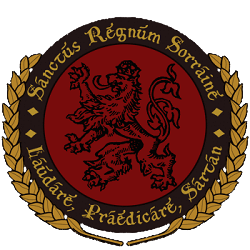Sorraine

The Holy Kingdom of Sorraine was created from Sartan's flames. Its regions stretch from the western badlands to the northern mountain cradle; protecting the serene capital of Ozrat within. The land is a Theocratic Kingdom ruled by the authority of the Crown and by the divine guidance of those closest to Sartan; all are bound by his Holy Law. Sorraine represents true strength, honor, and valor as a doctrine of faith, for Sartan blesses those who live in verity. The zealous pilgrim, the honored warrior, the courageous leader, and the valorous hero will forever be welcome. |
Error: No contents found at URL https://battlemaster.org/data/realm/7/30.

The Holy Seal Of Sorraine | |
| Overview | |
| Nobles | |
| Council | |
| Regions | |
| UnknownSome use of "" in your query was not closed by a matching "". | |
[[Category:]][[Category:]]
Genesis
The Holy Kingdom of Sorraine was created as a result of a series of secessions in the northern section of Toupellon. At the time, starvation and neglect ran rampant in the northern regions, while religious strife between the Church of Sartan and the Adgharhin Way sowed seeds of mistrust and discontent with the ruling body of Toupellon. Two of the three dukes in the north, His Grace Jatha Cyrith of Ossaet and Caspius Arundel of Ozrat, were avid members of the Sartanian religion and responsible title holders. It was the latter who - after mention of controlled successions - fostered the idea for Sartan's return to power in the form of a newly created Theocratic Kingdom. However, such a thing would be strongly opposed in a Kingdom of heretics and non-believers, forcing Caspius to conceive a plot of secession.
With all due haste, Caspius formulated ideas for his new realm based off the work of his late sister Katerina, while secretly gaining the support of Duke Jatha and High Priestess Selene Octavius. It was important to them that the new realm would have a system of government that was unlike the previous Sartanian realms of the past: the fallen theocracies of Sartania and NeoSartania. Alliances were among the top priorities, along with a careful balance of power between crown and church. With their goals set, Caspius proceeded to form treaties and bargains with realms around the continent, attempting to solidify the success of his plot with the input of other rulers.
On the second day since the plot was conceived, word of the duke's treachery reached King Claude Finsternis and Lord High Justice Galiard Scarlett of Toupellon, earning Caspius a banishment that would do little to prevent his actions. However, King Claude rapidly realized that Toupellon was an idea of the past, a Kingdom without identity nor faith in its cause. As a result, he declared the dissolution of the Toupellonian government, removing the ban placed on Caspius.
Soon thereafter, Her Grace Taylin Indirik of Akanos converted to the Church of Sartan, immediately prompting Caspius to share his plans with her. With an agreement made between them, Caspius seceded his Duchy on the third day, formally creating the Holy Kingdom of Sorraine. Duchess Taylin followed several days after, but an unexpected turn of events prevented Duke Jatha from doing so.
The Combined Government of Crown and Church
System
The Holy Kingdom of Sorraine is a theocratic kingdom dedicated to Sartan. It is ruled by the crown holder and the supreme leader of the church within the realm - who reserves all judicial power. Together, all decisions are effectuated with both efficiency and the one true religion in mind. ((Paragraph unfinished.))
The crown holder and his council decide on delicate matters directly concerning the realm, its preservation, and its place on the continent. Whereas the Holy Synod is the court tribunal at which members of the faith, including the crown holder, deliberate and issue consequence on any breach of crime save petty treason, high treason, and the theft or arson of crown possession. This is done through an Ad Hoc basis, meaning that a generally accepted crime or morally wrong decision can be tried without any attempts to avoid a specific definition or prior requisite for said crime. Generally, what warrants a crime is the breach of the warrior's code and its following clauses found here
Accompanying these two congregations is the Council of Fire, the Lords' Assembly, and the Knights' Assembly. The Council of Fire is your standard fashioned military council at which the crown, his or her heir, and all military commanders are part of. Orders, tactics, and anything related to war or conflict are discussed within this council.
((Page still in progress.))